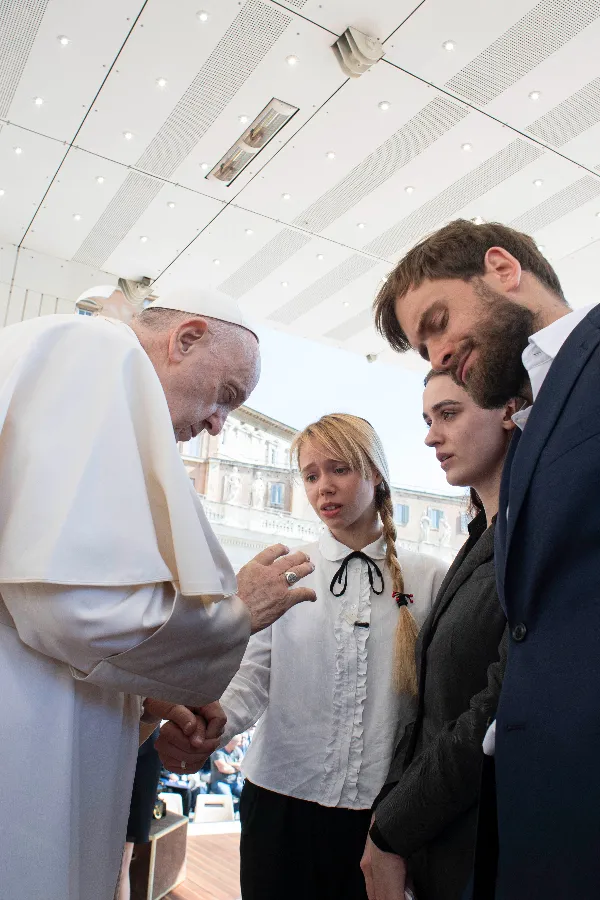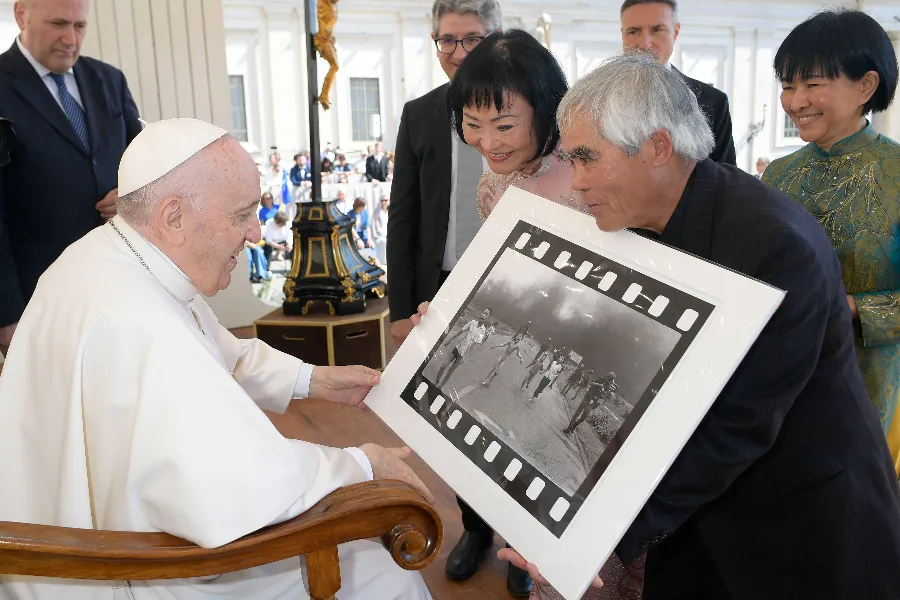
Vatican City, May 11, 2022 / 10:30 am (CNA).
Pope Francis met on Wednesday morning with the wives of two Ukrainian soldiers who are currently fighting to defend the besieged city of Mariupol.
After his general audience on May 11, the pope held the hands of the Ukrainian women, Kateryna Prokopenko, 27, and Yulya Fedosiuk, 29.
Prokopenko is married to Ukrainian Lt. Col. Denis Prokopenko, the man currently leading the Ukrainian last stand to defend the Azovstal steel plant in the port city of Mariupol.
“You are our last hope. We hope that you can save their lives. Please don’t let them die,” Kateryna Prokopenko can be heard telling Pope Francis in a short video of their five-minute meeting.
After the audience, Prokopenko told journalists in St. Peter’s Square: “We hope that this meeting will just give us the chance to save their lives.”
“Now we are ready for the actions from the pope, from his delegation. And our soldiers are ready to be evacuated to a third country. They are ready to lay down their arms in case of evacuation to the third country.”

Fedosiuk, who is married to Ukrainian soldier Sgt. Arseniy Fedosiuk, said in a video interview recorded by the Italian newspaper La Repubblica that they told the pope about the severe conditions within the Azovstal steel plant, where their husbands are fighting.
“We told the pope that 700 of our soldiers are injured. They have gangrene, amputations, their flesh is rotting, and many of them are dead. We couldn’t bury them. We couldn’t bury them [according] to Christian tradition and we ask pope to help us,” she said.
The Ukrainian women also handed the pope two letters, according to the newspaper Corriere della Sera.
The first letter was signed by Metropolitan Onufriy, who was elected Orthodox Metropolitan of Kyiv and All Ukraine in 2014, in which he reportedly appealed to Russian President Vladimir Putin to let the Azovstal fighters go.
The second letter was from the women themselves, who asked the pope during their meeting to “come to Ukraine and to speak with Putin.”
“We ask pope to help us. We ask pope to be the third party of this war and to let them go through the green corridor, and he told us that he will pray for us and he is doing everything for that,” Fedosiuk said.
At the end of his general audience, Pope Francis also greeted Vietnam War photographer Nick Ut.
The former Associated Press photographer is known for his 1972 Pulitzer Prize-winning photograph, “The Terror of War,” which is also known as the “Napalm Girl.”

Ut, who is Vietnamese American, met the pope with Phan Thi Kim Phuc, who is the young girl pictured in the photo. She was nine years old at the time the photo was taken in her hometown of Trảng Bàng during the Vietnam War.
Kim Phuc, who is now 59 years old, lives in Toronto with her family.
Vatican News reported that she said: “That image continues to remind me that I lost my childhood. Only over time, however, did I understand its value.”
If you value the news and views Catholic World Report provides, please consider donating to support our efforts. Your contribution will help us continue to make CWR available to all readers worldwide for free, without a subscription. Thank you for your generosity!
Click here for more information on donating to CWR. Click here to sign up for our newsletter.





Leave a Reply